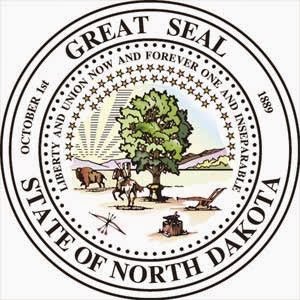The Dakotas:
North Dakota and South Dakota are known as "twin states" because they were admitted to the Union on the same day, November 2, 1889. No one knows which state was admitted first because President Benjamin Harrison purposely shuffled and then blindly signed the papers. Alphabetically, North Dakota is recognized as the 39th state and South Dakota the 40th State. However, the states aren't identical twins. They have similar shapes, sizes, and climates, but differ in many other ways.
North Dakota, Peace Garden State, Flickertail State, Roughrider State, Dakota
Aerial America: The Dakotas
Upper Midwestern region of the United States.
"Liberty and Union Now and Forever, One and Inseparable"
What does the name North Dakota mean?
"Dakota" is the Sioux Indian word for friend. President James Buchanan signed the bill creating the Dakota Territory in 1861.
As with many states, several nicknames have accompanied North Dakota throughout its history. Formally adopted in 1957, the nickname Peace Garden State appears on North Dakota license plates. The International Peace Garden straddles the international boundary between North Dakota and the Canadian province of Manitoba. In 1953, a Senate bill was defeated for the adoption of Flickertail as the official emblem of the state.The North American ground squirrels, Richardson's ground squirrels (Flickertail), are abundant in North Dakota. A tourism program of the 60s and 70s promoted the name Roughrider State. In both 1971 and 1973, the Legislative Assembly defeated bills intended to change the words Peace Garden State on state license plates to Roughrider Country. There was an attempt to drop 'North' from the state name with intentions of the state becoming Dakota. This was also defeated by Legislature in 1947 and again in 1989.
Take in the soaring views above a state that inspired a future president, launched the country's first millionaire, and kept a dark, rich secret under its expansive prairies for centuries. This lofty journey over North Dakota highlights the Roughrider State's grand beauty, which healed a grieving Teddy Roosevelt and transformed him into a defender of America's wild land. Explore the state's booms and busts, from fur trade explosions to frontier battles to the thousands of oil wells that dot the land and house flaming vents that are visible from space.
North Dakota is located in theAnother of North Dakota's nicknames is the "Sioux State," which comes from the name of the original Native American settlers of the state's land. Today, about 20,000 Native Americans live in North Dakota and make up the largest minority group in the state. The Dakota Territory originally included the area covered today by North and South Dakota as well as Montana and Wyoming. This year (2014) both states are celebrating their 125th anniversary since on November 2, 1889, North and South Dakota were admitted to the Union. North Dakota became the 39th state and is officially known as The Peace Garden State. A ride by land or in the air captures an iconic view of amber waves of grain. Only Kansas harvests more wheat than North Dakota. The Capital of North Dakota is Bismarck.
Upper Midwestern region of the United States.
The western meadowlark was designated official state bird of North Dakota in 1947 (see list of all state birds). The western meadowlark is a familiar songbird of open country across the western two-thirds of the continent. (from Wisconsin to Texas and west to the Pacific). Kansas, Montana, Nebraska, Oregon, and Wyoming also recognize the western meadowlark as state bird.
The Western Meadowlark's song is a buoyant, flute-like melody.
North Dakota designated the Nokota horse as the state honorary equine in 1993. Fourteen states have adopted state horse symbol.
In 2007, North Dakota designated the chokecherry as the official state fruit.
North Dakota State Tree: American Elm
North Dakota designated the American Elm as the official state tree in 1947. Massachusetts also recognizes the American elm as the state tree.
North Dakota designated the wild prairie rose as the official state flower in 1907. Found growing along North Dakota roadsides, in pastures, and in native meadows, the wild prairie rose has five bright pink petals with a cluster of yellow stamens in the center. Iowa also recognizes the wild prairie rose as state flower.
The Mandan Railroad Museum was designated the official state railroad museum of North Dakota in 1989. Large and small railroad artifacts fill all corners of the museum, demonstrating the uniqueness of items designed and made specifically for the operations of the railroads.
North Dakota State March: Flickertail March
Somewhere Along the Highway
Somewhere along the highway
Lies a field of amber durum wheat
Where footsteps of ghostly laborers
Tread among its lofty, slender stalks
Lies a field of amber durum wheat
Where footsteps of ghostly laborers
Tread among its lofty, slender stalks
Visions unlock
scattered memories
Of a holiday in the
countrysideWhere within the ardor of autumn
Lay noonday siestas and midday walks
Photographs, hand-written diaries
Connect past
with the present
As I ponder to still remember
As I ponder to still remember
Ripples of grain ebb like the ocean
Whilst golden wheat is set against
Morning azures of September
A journey down the
highway
Begs leaning out
the window
Storing mental images
While touched by misty rain
Storing mental images
While touched by misty rain
Lofty, slender
stalks
Sway within the mist
Evoking America—
"Amber waves of grain"
Sway within the mist
Evoking America—
"Amber waves of grain"
©2013 catnipoflife
Sharla Lee Shults
Sharla Lee Shults


















No comments:
Post a Comment